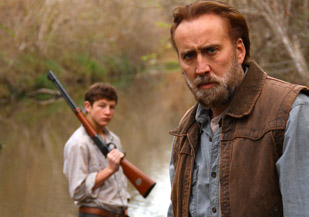BOP Interview: Nicolas Cage
Also: Tye Sheridan and David Gordon Green
By Ryan Mazie
April 11, 2014
“Restraint” isn’t the word that jumps to most audiences’ minds when picking a word to describe Nicolas Cage’s recent performances. It also isn’t a suitable adjective for director David Gordon Green’s most well known work, Pineapple Express and Eastbound & Down. However, Cage and Green’s unnerving realistic adaptation of Larry Brown’s slow burn southern gothic novel Joe is a welcome reinvention for the director, and especially Cage.
“I’ve experimented with abstract [performance styles], what I call ‘Western kabuki’,” said Cage during our interview for Joe. “I was at this point where I just wanted to find a part where I didn’t design the performance, but I just felt it and could be it. Whatever the mistakes I’ve made in the past, which I won’t go into detail with, I wanted to put them into a character, a portrayal of understanding, and use the mistakes in a way I wouldn’t have to act so much.”
The veteran actor stars as the titular rugged character whose mouth opens up more often for a swig of liquor than to spout out words. An ex-con who is trying to stay on the straight and narrow by running a tree poisoning business, Joe takes an unlikely mentorship to a 15-year-old boy (Mud’s Tye Sheridan) who has the burden of an alcoholic and abusive father. The two are faced with the choice of redemption or vengeance, with the tension coming from the impending sense of dread that one of the characters will finally explode after hitting his boiling point.
In an interview with Nicolas Cage, Tye Sheridan and director David Gordon Green, the three talked about on set improvisation, capturing authenticity, working in the woods, Bruce Lee, and Häagen-Dazs vanilla ice cream.
Mr. Cage, you have experimented with film acting in the past and went more surrealistic and operatic, versus a film like Joe and Frozen Ground that is more photorealistic and natural. How do you decide which stylistic direction will shape your performance?
Nicolas Cage: It’s the material and where I am at in my life. There has to be a mechanism in the script to go that “Western Kabuki” or “Baroque” way where it still connects with the audience in a contemporary environment. Silent film actors from the ‘20s or German impressionistic actors like Max Schreck, it was a part of their style back then. So I was trying to figure out how to bring that back into contemporary cinema and the way to do it is to find someone who is either A) going nuts like Peter Loew in Vampire’s Kiss, B) he’s on crack like Terence McDonagh in Bad Lieutenant, or C) he’s sold his soul to the devil and now his head goes on fire into a skull in black leather. So those were all fun ways to have it connect with a modern audience. But when I got around to Joe, and also Frozen Ground, I just wanted to infuse the vessel of the character with my memories and my life experience and not design a performance from the outside in. You can go as big as you want as long as it has emotional content. I always say, “Well, if you think it is over the top, then tell me where the top is.” I don’t think anyone can, but if you can tell me where the top is, then I will tell you if I’m over it.
David, you encouraged the script to be more of a guideline so your actors could improvise on set. Can you elaborate a bit about that?
David Gordon Green: The beauty of this project is that we have a great novel as a guideline and resource with volumes of interior monologue and subtext that we could use as an emotional archive. We had a great screenplay by Gary Hawkins, one of my college professors, who had known Larry Brown very intimately and made a documentary of his life. So when it came down to the production of the film and to define the faces and voices of the characters who have been on the page all of these years, I find it my job to make that transition an organic one. Not only understand where those people are coming from and memorize lines, but bring themselves and their own emotional honesty, which often leads to an improvised process. Nic and Tye would tell stories and I would keep a notebook of it. Also casting a lot of the supporting actors, who were non-traditional, they wouldn’t read the script, but I talked them through who their character was about and I’d let them use their own authenticity and instincts.
Continued:
1
2
3




